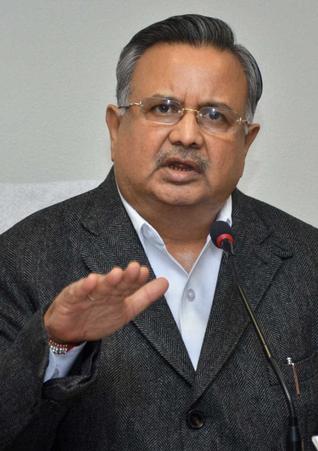BHOPAL, October 27: BJP Chief Minister Raman Singh is the face of the reformed public distribution system in Chhattisgarh and indeed, he is still banking on it for a third consecutive term despite the anti-incumbency factor against several MLAs and a few ministers in his council.
In his recent vikas yatra, he showcased development and focussed on the path-breaking Public Distribution System (PDS) reforms that were dovetailed into the Chhattisgarh Food Security Act in 2012. The state law provides legal entitlements for subsidised food grains to 90 per cent of the population, of which one-third is tribal.
Outclassing the UPA government’s food security scheme at the Centre, the Raman Singh government not only provides 35 kilograms of rice at Re. 1 (to the poorest of the poor families) and at Rs. 2 per kg to priority households, but also provides discounted pulses/grams and free salt as part of the nutrition package in his near-universal programme. Not only has the legal entitlement been enhanced from 70 per cent to 90 per cent of the population, food security in the state has been placed decisively in the hands of women. By all accounts, if they come out to vote, women will give him the edge over Congress that he is desperately looking for in this election.
In contrast, the UPA’s food security law provides 5 kg of subsidised food grains per person per month to an average of 50 per cent urban and 75 per cent rural population.
There is a cap on the percentage of beneficiaries and only after the states identify the beneficiaries afresh and reform PDS to plug leakages will they be allotted their quota of foodgrains by the Union Food Ministry under the new law. About 40 per cent of the grains meant for the PDS find its way back into the open market because of leakages in the system. So far only Delhi, Haryana, Rajasthan and Uttarakhand have declared their readiness to implement the new law.
It may be recalled that by the time Raman Singh went into the 2008 Assembly elections seeking a second term, he had already fine-tuned PDS reforms to plug leakages, ensure doorstep delivery and simultaneously introduced innovative reforms for decentralised procurement and distribution of food grains. Not only was electronic weighing of farm produce introduced, but farmers were paid directly and immediately by cheque. Private and individual owners of fair price shops were sacked and the ration shops were handed over to self-help groups who would ensure completion of food grains delivery by the seventh of every month.
Yet what should have been his finest hour in 2008, Raman Singh could only repeat his 2003 performance with a tally of 50 seats (out of 90) and a marginal upward swing of 1.07 per cent vote share. The BJP’s main rival, the Congress, added one seat to its earlier tally.
This time round therefore, when elections are taking place under the shadow of the Bastar killing of local Congressmen, there is no saying if the PDS card alone will work for the incumbent government. Local demands, as well as issues of corruption, anti-incumbency and law and order will have equal weightage.
“Eight to 10 months ago, Raman Singh would have had a roller coaster ride to victory on the strength of his ‘role model’ PDS system. But not now,’’ said Biraj Patnaik, a right to food activist who has worked in the region for several years.
Tribal leader from Sarguja district, Gangaram Paitre, told The Hindu that the PDS system works well in the state including in the southern naxal-affected region. “Putting food security in the hands of women and enhancing the coverage to 90 per cent will ensure that many people, especially in rural areas, still back Raman Singh. Bestowing legal entitlements since the State Act was introduced in 2012 and keeping the programme open for those who might have been left out is a good thing.
“But on the other hand, violation of Panchayats (Extension to Scheduled Areas) Act, 1996 and displacing tribals without proper rehabilitation by giving away power plants, steel and coal mines to corporates in Raigarh, Korba, Jaitpur and Bastar is brewing resentment against the government.’’
Social activist Jean Dreze, however, feels that the Chhattisgarh government did get some credit for fixing the PDS in earlier elections [two terms]. “Whether it can play that card again, I have no idea,” he said. “The important thing is to help people secure their entitlements on the ground. That is the purpose of an act, but the results are not automatic.”

